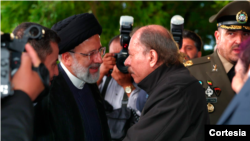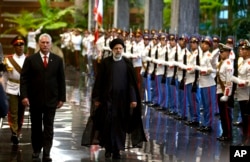The tour of the president of Iran, Ebrahim Raisifor Venezuela, Nicaragua and Cuba, sent a “symbolic message” of unity against a common enemy: the United States, although it is very unlikely that it will materialize in the economic benefits long awaited by its Latin American allies, at least in the case of Managua and Havana, say experts.
“We are friends in difficult times,” Raisi said on his first trip to Latin America since he assumed the Iranian head of state last August.
Iran, Venezuela, Nicaragua and Cuba face harsh economic sanctions from Washington. The visit of the leader of the Islamic nation, an oil exporter and in better conditions than its Latin American allies – sunk in serious crises – raised expectations of future bilateral cooperation that would be a boost to their battered economies.
However, despite the signed agreements and the promises of aid, for experts such as Mario González Corzo, a doctor in Economics, Raisi’s visit has “absolutely political symbolism” in regards to countries like Nicaragua and Cuba, with an even more difficult situation than Venezuela.
“The only benefit that Iran would get is, I think, a political benefit, a political symbolism, not something economically tangible,” he told the voice of america the professor of the Faculty of Economics at Lehman College of The City University of New York (CUNY), who described as “high risk” an investment in a nation like Cuba, with a known history of defaults and low productivity.
promises between allies
Before arriving at his first stop, Venezuela, Raisi insisted that he hoped his tour would be “a turning point” in his country’s foreign relations. During his stay in Caracas, he described the relationship with the government of President Nicolás Maduro as “special” and “strategic”.
In Venezuela, according to official statements, Raisi supervised the signing of 25 bilateral economic agreements worth 3,000 million dollars, about which no details were revealed, although it was revealed that they are related to the areas of petrochemicals, mining, health and education.
Maduro assured that this alliance with Iran would make them “invincible” and described the Islamic nation as “one of the most important emerging powers” in the world.
“The level of economic cooperation was at 600 million dollars two years ago, today that commercial and economic cooperation has increased to 3,000 million dollars,” Raisi clarified, adding that “the goal is to bring that level of cooperation to 10,000 million dollars, and the next step is to 20,000 million dollars”.
In his second stop, Raisi maintained the same rhetoric, appealing to the “special” relationship between the two countries in the face of US aggression. However, the conversation regarding the economy was very different.
“We want to increase and deepen our relations in all political, economic, cultural areas and in all their spheres, especially in matters of science and technology,” the Iranian president said without adding more details or announcing specific agreements in his meeting with his Nicaraguan counterpart Daniel Ortega.
While in Cuba, his last stop on the week-long tour, the Iranian president met with Cuban President Miguel Díaz-Canel. Unlike in Venezuela and Nicaragua, Raisi did not make public speeches or harangue against the US, but instead highlighted the opportunities in the field of electricity production and mining.
No specific agreements were announced in Havana either, although according to the conclusions of a business forum, businessmen and officials from both countries will create an intergovernmental commission to evaluate the areas of cooperation.
Advantageous cooperation?
According to the former Nicaraguan ambassador to the Organization of American States (OAS), Arturo McFields, Raisi’s visit to Managua leads the country “into a high-voltage geopolitical game.”
According to McFields, this could be dangerous for the Central American nation, since Iran “does not represent in any economic sense” a contribution to Nicaragua.
“Daniel Ortega is like the prodigal son of Iran’s relationship with Latin American regimes like Cuba and Venezuela. In the case of Nicaragua, (economic cooperation) is zero million dollars. There is nothing; it is more than anything a cooperation in the political-ideological field ”, he assured the VOA.
During Raisi’s visit, the president promised to strengthen cooperation in Nicaragua “in all aspects”, and at least three memorandums were signed that cover supposed reinforcement in economic, commercial and scientific-technical issues.
But McFields says Iran’s cooperation “has been more promises and no blueprints.”
For his part, Professor Mario González Corzo affirms that in the case of Cuba, in a desperate search for partners that can revive its battered economy, it is not an attractive proposal for Iran.
The problem on the island “is not so much the lack of fuel, but rather the lack of investment in the Cuban energy sector,” an injection of capital that, according to the economic expert, would have to be “very large.”
Added to this are the bureaucratic obstacles and the limits on foreign capital imposed by the island, where foreign companies cannot control more than 49% of the projects.
Cuba “right now is interested in any partner,” said the professor, who recalled that the growth projections for the island’s economy for this 2023 were reduced from an optimistic 3% to a revised 1.2%, which could even be lower due to that tourism has not just taken off.
“These data are not very encouraging, that is, they do not invite much investment, especially a country that exports oil like Iran does, which can sell it to the rest of the world and the rest of the world has the currency to pay it, contrary to Cuba,” he emphasized.
political symbolism
Analysts consider the current president as an heir to former Iranian President Mahmud Ahmadinejad (2005-2013), known for his ultra-conservative extremism and a close ally of Managua, Caracas and Havana.
For Professor González Corzo, Raisi’s trip comes at a time when Iran is changing. The protests over the death of young Mahsa Amini in police custody, demonstrated discontent in the country.
In the Islamic country “there is a younger generation that is questioning the direction of Iran and the international position of the regime,” he warned. Therefore, this would be a way of demonstrating that the Iranian presence is outside of its more usual spheres of influence.
“Iran also calculates that Latin America is taking a turn to the left again and then what is more symbolic than going to the bastion of the international left that is Cuba?” he added.
Raisi arrived in Latin America shortly after very similar tours by senior officials from Russia and China, who are also seeking to consolidate their presence in Washington’s hemisphere of influence, geographically very close to Venezuela, Nicaragua and Cuba.
Experts point out that this shows that at the moment there is “an onslaught of the geopolitics of Iranian and Chinese authoritarianismin particular to directly attack the United States in its ‘backyard'”.
A visit with little effect for the US
In the US, the visit of the Iranian president to these three Latin American countries should not cause “concern” because “there is little beyond the rhetoric that these states can do to affect the US and its policies in Latin America and the Middle East,” he said. to the VOA Russell Lucas, professor of international relations at Michigan State University.
In the case of military coordination, for example, between Iran and Venezuela, Cuba or Nicaragua, “it will be easily identified by the US and probably cannot affect (the country),” Lucas explained.
According to the expert, the Iranian president’s visit would have an aspect of “help to circumvent existing economic sanctions and perhaps limit the possibility of the US imposing more sanctions.”
A State Department spokesman responded last week to a request for comment from the voice of america Assuring that they take seriously Iran’s attempts to expand its “evil” activities throughout the world, including in the Western Hemisphere.
“We remain firm in our commitment to the Venezuelan people, which includes support for their democratic aspirations, as well as assistance to address the humanitarian crisis in Venezuela with a broad coalition of partners,” he said when asked about the US position on the visit. of the Iranian president to Venezuela.
During a press conference last Wednesday, State Department spokesman Matthew Miller said “concerns about Iran’s activities” are clear, but said he did not think it “is necessarily surprising that these countries are becoming more diplomatically involved.” ”.
The director of the rule of law program of the Inter-American Dialogue in Washington, Tamara Taraciuk, assured that it is “reasonable” that the governments of these countries seek to promote international bridges due to the “isolation” they face in their respective regions.
“This type of visit is a reflection of the global geopolitical reality — when dictators feel isolated, they come together, not only for ideological interests, but also for economic and commercial interests,” he pointed out. VOA.
The US administration limited its comments on the visit to ensuring that they have been “quite clear about our concerns about Iran’s activities and I don’t think it is necessarily surprising that these countries are becoming more diplomatically involved,” the US administration said during a press conference. Wednesday Matthew Miller, State Department spokesman.
More than a message to the US, the trip could also be an opportunity for “Iranians to show their people that they will not be intimidated by the US and that they have friends around the world,” said Christopher Fettweis, a professor of international politics at the Tulane University in Louisiana.
“Actually none of this poses any real problems for us, let alone threats. These are weak countries seeking to assert themselves on the international stage,” Fettweis told the VOA. “It’s nothing to worry about.”
According to Fettweis, the “true interests” of the US with Iran include restarting the Joint Comprehensive Plan of Action on that country’s nuclear program, and putting its oil – as well as Venezuelan oil – on the market “to compensate for the enormous power that the Gulf states are hoarding with Russia oil essentially out of line.”
Connect with the Voice of America! Subscribe to our channel Youtube and activate notifications, or follow us on social networks: Facebook, Twitter and Instagram.






![[Img #74662]](https://thelatestnews.world/wp-content/uploads/2024/12/Organisms-with-the-shortest-life-150x150.jpg)










